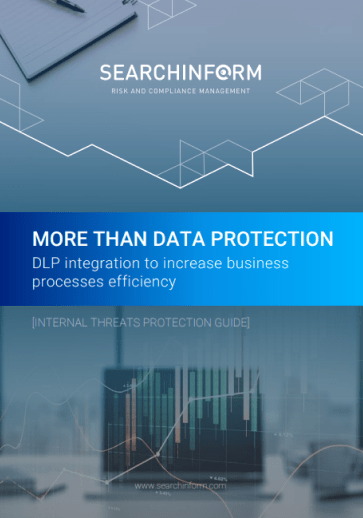Understanding the Critical Role of a PCI Compliance Manager
- Who Is PCI Compliance Manager?
- Duties and Responsibilities of a PCI Compliance Manager
- Qualifications and Skills Required
- Best Practices for PCI Compliance Managers
- Challenges Faced by PCI Compliance Managers
- Enhancing PCI Compliance with SearchInform Solutions: Empowering Managers for Comprehensive Data Protection
Who Is PCI Compliance Manager?
A PCI Compliance Manager is a professional responsible for ensuring that an organization complies with the Payment Card Industry Data Security Standard (PCI DSS). This standard is a set of security requirements designed to ensure that companies that process, store, or transmit credit card information maintain a secure environment.
The PCI Compliance Manager typically oversees the implementation and maintenance of security measures to protect sensitive cardholder data, conducts regular audits and assessments to identify vulnerabilities, and coordinates remediation efforts to address any non-compliance issues. They may also be involved in developing and implementing policies and procedures related to PCI compliance, as well as providing training and awareness programs for employees.
The role of a PCI Compliance Manager is crucial in helping organizations mitigate the risk of data breaches and maintain the trust of customers and partners in their payment card processing systems.
Duties and Responsibilities of a PCI Compliance Manager
The PCI Compliance Manager plays a critical role in ensuring that an organization adheres to the strict requirements outlined in the Payment Card Industry Data Security Standard (PCI DSS). This entails conducting regular assessments and audits of systems, processes, and controls to identify any gaps or instances of non-compliance.
Upon uncovering deficiencies or vulnerabilities, the manager coordinates efforts to address them by implementing necessary security controls, policies, and procedures to mitigate risks and achieve compliance.
Additionally, the PCI Compliance Manager is responsible for continuously monitoring systems and processes, providing regular reports to management and stakeholders, and developing and maintaining policies, procedures, and documentation related to PCI compliance.
They also oversee training and awareness programs for employees and serve as the primary point of contact for PCI-related inquiries from internal teams, external auditors, payment card networks, and regulatory authorities.
Overall, the PCI Compliance Manager plays a crucial role in protecting sensitive cardholder data, reducing the risk of data breaches, and maintaining trust with customers, partners, and regulatory bodies. Staying updated on changes to PCI DSS standards, industry best practices, and emerging threats is essential to ensure the organization's compliance efforts remain effective and up-to-date, further emphasizing the importance of this role in safeguarding critical financial information.

Qualifications and Skills Required
Becoming a PCI Compliance Manager typically requires a combination of qualifications and skills. Firstly, a bachelor's degree in computer science, information technology, cybersecurity, or a related field is often a prerequisite, although some employers may prefer candidates with advanced degrees or professional certifications. Relevant certifications such as Certified Information Systems Security Professional (CISSP), Certified Information Security Manager (CISM), Certified Information Security Auditor (CISA), or Payment Card Industry Professional (PCIP) are highly desirable and may even be required by certain employers. Additionally, several years of experience in cybersecurity, information security, risk management, or compliance roles are typically necessary, with specific expertise in PCI DSS compliance highly valued.
An in-depth understanding of the Payment Card Industry Data Security Standard (PCI DSS) and its requirements is crucial, along with familiarity with other relevant standards and regulations such as GDPR, HIPAA, or ISO 27001. Proficiency in information security technologies and tools, including firewalls, intrusion detection/prevention systems, encryption, vulnerability scanning, and penetration testing tools, is essential. Strong analytical skills are needed to analyze complex systems, identify security risks, and develop effective mitigation strategies. Furthermore, excellent communication skills are necessary to interact with stakeholders at all levels of the organization, as well as external auditors, vendors, and regulatory authorities. Project management abilities are also vital for planning, organizing, and executing compliance initiatives, while attention to detail ensures that all requirements are accurately met and documented. Finally, leadership and teamwork skills are essential for leading cross-functional teams, collaborating with colleagues, and garnering support for compliance initiatives. Overall, individuals aspiring to become PCI Compliance Managers must possess a well-rounded combination of education, certifications, experience, technical proficiency, and interpersonal abilities.
Best Practices for PCI Compliance Managers
Here are some best practices for PCI Compliance Managers to ensure effective compliance with the Payment Card Industry Data Security Standard (PCI DSS):
Understanding PCI DSS requirements involves delving into the intricacies of the PCI DSS standards and comprehending how they apply to your organization's specific environment and scope of cardholder data processing. This entails conducting a thorough analysis of the various PCI DSS requirements and determining how they impact your organization's systems, processes, and controls.
Establishing a compliance program entails developing and implementing a comprehensive plan to ensure adherence to PCI compliance requirements. This involves creating policies, procedures, and controls that address all relevant aspects of PCI DSS, tailored to your organization's unique needs and circumstances. By establishing a structured compliance program, you can systematically address and manage the complexities of PCI DSS compliance.
Conducting regular assessments is crucial for maintaining PCI compliance. These assessments involve performing periodic audits of your organization's systems, processes, and controls to identify any potential gaps or vulnerabilities. By conducting these assessments on a routine basis, you can proactively identify and address security weaknesses before they can be exploited by attackers.
Implementing strong security controls is essential for protecting cardholder data and preventing unauthorized access. This includes deploying robust security measures such as firewalls, encryption, access controls, and intrusion detection/prevention systems. By implementing these security controls, you can significantly reduce the risk of data breaches and unauthorized access to sensitive information.
Monitoring and logging all relevant system and network activity is critical for detecting and responding to security incidents promptly. This involves maintaining detailed logs of all system and network activity and regularly reviewing them for signs of suspicious or unauthorized behavior. By monitoring and logging activity, you can quickly identify and respond to security incidents before they escalate into major breaches.
Educating employees about PCI DSS requirements and security best practices is essential for maintaining compliance. This involves providing training and awareness programs to educate employees about their roles and responsibilities in maintaining PCI compliance and safeguarding cardholder data. By ensuring that employees are well-informed and aware of security best practices, you can significantly reduce the risk of human error and security breaches.
Securing third-party services involves ensuring that third-party service providers who handle cardholder data comply with PCI DSS requirements and have appropriate security measures in place. This includes conducting thorough due diligence on third-party vendors and ensuring that they adhere to PCI compliance standards.
Maintaining documentation of your organization's compliance efforts is crucial for demonstrating compliance to auditors and regulators. This involves keeping detailed records of policies, procedures, assessments, and remediation activities related to PCI DSS compliance. By maintaining comprehensive documentation, you can provide evidence of your organization's commitment to maintaining PCI compliance.
Staying informed about changes to PCI DSS standards, industry best practices, and emerging threats is essential for ensuring that your compliance efforts remain effective and up-to-date. This involves actively monitoring developments in the field of PCI compliance and adapting your compliance program accordingly.
Engaging with stakeholders is important for addressing compliance challenges and ensuring alignment with industry standards and requirements. This involves fostering open communication and collaboration with internal teams, external auditors, payment card networks, and regulatory authorities. By engaging with stakeholders, you can address compliance issues proactively and ensure that your organization remains in compliance with PCI DSS standards.
By following these best practices, PCI Compliance Managers can help their organizations maintain compliance with PCI DSS standards, protect cardholder data, and reduce the risk of data breaches and financial penalties.
Challenges Faced by PCI Compliance Managers
PCI Compliance Managers face several challenges in their role of ensuring adherence to the Payment Card Industry Data Security Standard (PCI DSS). One significant challenge is the complexity of the PCI DSS requirements themselves. The standard comprises numerous technical and procedural requirements, and interpreting and implementing them in a way that aligns with the organization's specific environment and business processes can be daunting. Additionally, the PCI DSS requirements are subject to periodic updates and revisions, further complicating compliance efforts. Keeping abreast of these changes and understanding their implications for the organization's compliance program requires ongoing vigilance and expertise.
Another challenge for PCI Compliance Managers is the dynamic nature of cybersecurity threats and vulnerabilities. Cyber attackers are constantly evolving their tactics and techniques, making it challenging to stay ahead of emerging threats. Implementing effective security controls to protect cardholder data requires not only technical expertise but also a proactive approach to identifying and mitigating potential risks. Moreover, the increasing sophistication of cyber attacks means that organizations must continually reassess their security posture and adapt their defenses accordingly.
Furthermore, PCI Compliance Managers often face challenges related to resource constraints and competing priorities within the organization. Securing budgetary allocations and obtaining necessary resources to support compliance initiatives can be challenging, particularly in organizations where cybersecurity may not be seen as a top priority. Additionally, PCI compliance efforts often require collaboration and coordination across various departments and stakeholders, which can be time-consuming and resource-intensive. Balancing these competing priorities while maintaining focus on achieving and maintaining PCI compliance can present a significant challenge for PCI Compliance Managers.
Lastly, ensuring compliance with PCI DSS standards can be particularly challenging for organizations that handle large volumes of cardholder data or operate in complex, decentralized environments. Coordinating compliance efforts across multiple business units, locations, and systems requires effective communication, coordination, and oversight. Ensuring consistent adherence to PCI DSS requirements in such environments can be challenging, as different parts of the organization may have varying levels of maturity in terms of security practices and compliance readiness. Overcoming these challenges requires strong leadership, collaboration, and a comprehensive understanding of the organization's unique compliance needs and challenges.
Enhancing PCI Compliance with SearchInform Solutions: Empowering Managers for Comprehensive Data Protection
SearchInform solutions offer several benefits for PCI Compliance Managers in their efforts to ensure adherence to the Payment Card Industry Data Security Standard (PCI DSS):
Comprehensive Data Discovery: SearchInform solutions provide advanced data discovery capabilities that help PCI Compliance Managers identify sensitive cardholder data stored across the organization's systems and repositories. This enables managers to gain full visibility into where cardholder data resides, facilitating more effective data protection and compliance efforts.
Real-time Monitoring and Alerts: SearchInform solutions offer real-time monitoring and alerting capabilities that enable PCI Compliance Managers to detect unauthorized access or suspicious activities related to cardholder data. By proactively monitoring for potential security incidents, managers can respond quickly to mitigate risks and prevent data breaches.
Data Loss Prevention (DLP) Capabilities: SearchInform solutions include robust data loss prevention (DLP) features that help PCI Compliance Managers prevent unauthorized disclosure or leakage of cardholder data. This includes capabilities such as content inspection, encryption, and policy-based controls to ensure that sensitive data is adequately protected at all times.
Compliance Reporting and Auditing: SearchInform solutions provide comprehensive reporting and auditing capabilities that enable PCI Compliance Managers to demonstrate compliance with PCI DSS requirements to auditors and regulators. Managers can generate detailed reports on compliance status, access controls, data access patterns, and other relevant metrics to provide evidence of adherence to PCI DSS standards.
Automated Remediation and Policy Enforcement: SearchInform solutions offer automated remediation and policy enforcement capabilities that streamline compliance efforts and ensure consistent application of security controls across the organization. Managers can define and enforce policies for data protection, access controls, and other security measures, reducing the risk of non-compliance and data breaches.
Integration with Existing Security Infrastructure: SearchInform solutions seamlessly integrate with existing security infrastructure, including SIEM (Security Information and Event Management) systems, identity and access management (IAM) solutions, and other security tools. This enables PCI Compliance Managers to leverage their existing investments in security technologies and achieve greater operational efficiency in managing PCI compliance.
SearchInform solutions provide PCI Compliance Managers with the tools and capabilities they need to effectively manage and maintain compliance with PCI DSS requirements. By leveraging advanced data discovery, monitoring, DLP, reporting, and policy enforcement capabilities, managers can enhance security posture, reduce compliance risks, and protect sensitive cardholder data from unauthorized access or disclosure.
Take control of your organization's PCI compliance efforts with SearchInform solutions. Empower your PCI Compliance Managers with advanced data discovery, real-time monitoring, data loss prevention, compliance reporting, and automated policy enforcement capabilities.
Ensure comprehensive data protection, reduce compliance risks, and safeguard sensitive cardholder data from unauthorized access or disclosure!
Extend the range of addressed challenges with minimum effort
Company news
SearchInform uses four types of cookies as described below. You can decide which categories of cookies you wish to accept to improve your experience on our website. To learn more about the cookies we use on our site, please read our Cookie Policy.
Necessary Cookies
Always active. These cookies are essential to our website working effectively.
Cookies does not collect personal information. You can disable the cookie files
record
on the Internet Settings tab in your browser.
Functional Cookies
These cookies allow SearchInform to provide enhanced functionality and personalization, such as remembering the language you choose to interact with the website.
Performance Cookies
These cookies enable SearchInform to understand what information is the most valuable to you, so we can improve our services and website.
Third-party Cookies
These cookies are created by other resources to allow our website to embed content from other websites, for example, images, ads, and text.
Please enable Functional Cookies
You have disabled the Functional Cookies.
To complete the form and get in touch with us, you need to enable Functional Cookies.
Otherwise the form cannot be sent to us.

Subscribe to our newsletter and receive a bright and useful tutorial Explaining Information Security in 4 steps!

Subscribe to our newsletter and receive case studies in comics!







